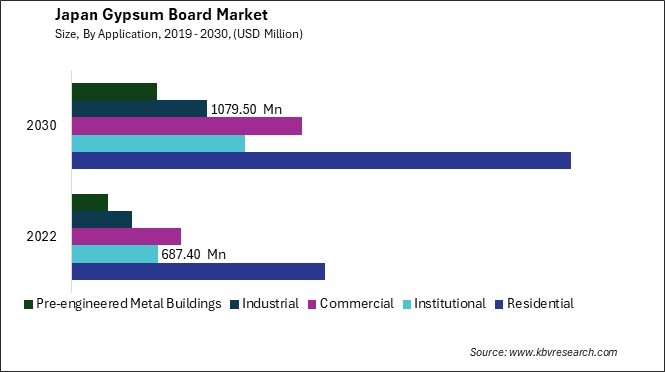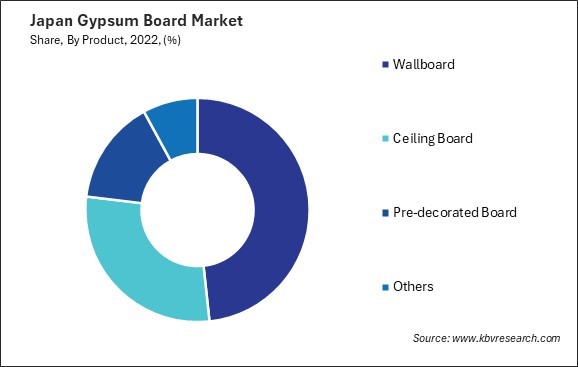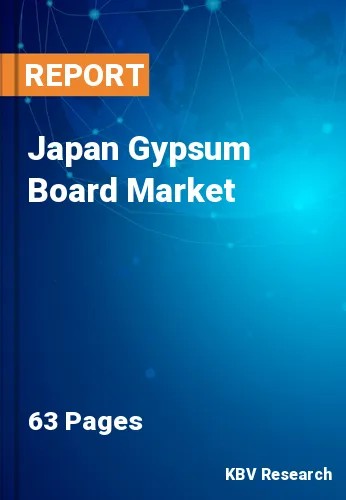The Japan Gypsum Board Market size is expected to reach $9 Billion by 2030, rising at a market growth of 9.3% CAGR during the forecast period. In the year 2022, the market attained a volume of 3792.3 Million Units, experiencing a growth of 8.7% (2019-2022).
The gypsum board market in Japan has witnessed steady growth over the years, owing to its widespread application in the construction industry. Japan's construction sector, known for its innovation and high standards, has been a key driver behind the demand for gypsum boards in the country. One of the primary factors contributing to the growth of the gypsum board market in Japan is the increasing focus on sustainable construction practices. Gypsum boards are eco-friendly materials that can be recycled and reused, aligning with Japan's commitment to environmental conservation.

Additionally, Japan's robust urbanization and infrastructure development projects have significantly boosted the demand for gypsum boards. With the growing population and need for modern housing solutions, the construction of residential complexes, commercial buildings, and industrial facilities has surged, driving the consumption of gypsum boards for interior finishing purposes. Manufacturers in Japan are continuously investing in research and development to introduce innovative gypsum board products with improved strength, durability, and fire resistance characteristics.
However, the gypsum board market in Japan faced challenges due to the COVID-19 pandemic, which disrupted construction activities and supply chains. Lockdown measures and social distancing protocols led to project delays and labor shortages, impacting the demand for gypsum boards. Moreover, uncertainties surrounding the economy and construction sector further dampened industry growth.
Despite the temporary setbacks caused by the pandemic, the gypsum board market in Japan is expected to rebound as construction activities gradually resume and government stimulus measures support infrastructure development. Moreover, increasing awareness about the benefits of gypsum boards, such as their durability, versatility, and environmental sustainability, is likely to drive market growth in the long term.
In Japan, the gypsum board market has witnessed a significant rise in infrastructure development, driven by several factors contributing to its growth and expansion. One key driver of the increased infrastructure development in Japan's gypsum board market is the country's focus on earthquake-resistant construction. Japan is situated in a seismically active region, making it imperative for buildings to be resilient to earthquakes. Gypsum board, with its lightweight yet durable properties, is a preferred choice for interior walls and ceilings in earthquake-resistant construction projects in Japan. As a result, there has been a surge in the use of gypsum board in both residential and commercial buildings across Japan.
Furthermore, the Japanese government has invested heavily in infrastructure projects to stimulate economic growth and address the country's evolving societal needs. These investments include transportation, healthcare, education, and housing. Gypsum board finds extensive application in these projects for partition walls, ceilings, and fire-resistant barriers, driving the demand for the material. In Japan, the Ministry of Land, Infrastructure, and Transportation (MLIT) plays a crucial role in overseeing the nation's infrastructure.
According to the MLIT, early detection and repair of at-risk infrastructure will help avert serious incidents and reduce maintenance and renewal costs by a massive 47 %, resulting in savings of $46 billion through 2048. As Japan continues to invest in infrastructure development and maintenance, the role of industries like the gypsum board market in providing essential materials and solutions to support these efforts is worth noting.
Moreover, advancements in technology and manufacturing processes have produced gypsum boards with enhanced properties such as improved fire resistance, moisture resistance, and acoustic insulation. These developments have further boosted the adoption of gypsum board in various construction projects in Japan, contributing to the overall growth of the gypsum board market. Therefore, Japan's focus on earthquake-resistant construction, government infrastructure investments, and technological advancements have propelled the growth of the gypsum board market in the country.
The residential construction sector in Japan has witnessed a notable surge in the utilization of gypsum boards in recent years. One of the key drivers behind the rising popularity of gypsum boards in residential construction in Japan is their ability to enhance interior spaces efficiently. Gypsum boards provide a smooth and uniform surface for painting or wallpapering, enabling homeowners to achieve desired aesthetics easily. Additionally, gypsum boards can be easily cut and shaped to accommodate various architectural designs and interior layouts, making them highly adaptable to diverse housing needs in Japan.
Moreover, demographic shifts and changing lifestyles have influenced the gypsum board market dynamics in Japan. With rising number of aging population and increasing urbanization, according to the International Trade Administration, the proportion of the population older than 65 will rise from 29% to 40 % by 2060 in Japan. As the older population rises there is a growing demand for modern, multifunctional living spaces that offer comfort, accessibility, and energy efficiency. Gypsum boards, known for their ease of installation and adaptability to various architectural designs, are integral to meeting these evolving housing needs. As a result, developers and homeowners alike are increasingly incorporating gypsum board-based solutions in residential construction projects, further driving the demand for these materials.
Furthermore, gypsum boards contribute to improved thermal and acoustic insulation, enhancing the comfort and livability of residential spaces. With growing emphasis on energy efficiency and environmental sustainability in Japan, using gypsum boards aligns with broader initiatives to reduce carbon footprints and promote eco-friendly building practices. Hence, the increasing utilization of gypsum boards in residential construction in Japan is driven by their ability to enhance interior spaces efficiently and contribute to improved thermal and acoustic insulation, aligning with broader initiatives for sustainability and meeting housing demands effectively.

In the gypsum board market in Japan, several companies contribute to the industry's growth and development, catering to the diverse needs of the construction sector. One of the prominent players in the Japanese gypsum board market is Yoshino Gypsum Co., Ltd. Established in 1937, Yoshino Gypsum has a long history of manufacturing high-quality gypsum products. The company offers a comprehensive range of gypsum board solutions for various construction applications, including residential, commercial, and industrial projects. Yoshino Gypsum's commitment to research and development has enabled it to introduce innovative products that enhance building performance and sustainability.
Tokuyama Corporation is also a significant player in the Japanese gypsum board market. Founded in 1918, Tokuyama Corporation initially focused on chemical manufacturing but later diversified into various industries, including construction materials. The company produces gypsum board products under the brand name "Tokura," catering to residential, commercial, and industrial construction projects. Tokuyama Corporation's emphasis on product quality and technological innovation has earned it a reputation for excellence in the gypsum board market.
Another major contributor to the gypsum board market in Japan is Taiheiyo Cement Corporation. As one of the largest cement producers in the country, Taiheiyo Cement Corporation also manufactures gypsum board and related building materials. Leveraging its expertise in cement production and construction materials, the company produces gypsum board products known for their durability, strength, and thermal insulation properties. Taiheiyo Cement Corporation's extensive distribution network ensures the widespread availability of its gypsum board products across Japan.
Sakai Chemical Industry Co., Ltd. is another key player in the Japanese gypsum board market. Specializing in chemical manufacturing and construction materials, Sakai Chemical Industry Co., Ltd. produces gypsum board products renowned for their superior strength, moisture resistance, and soundproofing capabilities. The company's commitment to sustainable practices and environmental stewardship aligns with Japan's construction industry's growing demand for eco-friendly building materials.
Furthermore, Asahi Kasei Corporation plays a significant role in the Japanese gypsum board market. With a diverse portfolio of products and services, including construction materials, Asahi Kasei Corporation offers gypsum board solutions that meet stringent quality standards and regulatory requirements. The company's focus on innovation and customer satisfaction has enabled it to maintain a strong presence in Japan's competitive gypsum board market. With a focus on quality, sustainability, and technological advancement, these companies are poised to shape the future of the gypsum board market in Japan.
By Application
By Product
Our team of dedicated experts can provide you with attractive expansion opportunities for your business.

